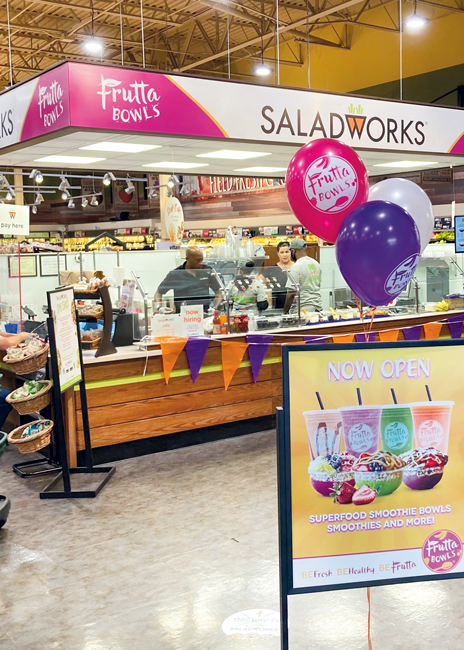The concept of co-branding continues to gain traction among multiconcept operators. The idea is pretty simple: Take two brands with a common customer base and complementary menus and combine them under one roof. Having at least two different menus to choose from, so the thinking goes, will make visiting the location more appealing to customers on an ongoing basis.
 Kelly Roddy, CEO, WOWorksMulticoncept operator WOWorks clearly embraces this line of thought, which plays a key role in the company’s growth plans. In December 2021, for example, WOWorks opened a co-branded Saladworks and Frutta Bowls location in West Bloomfield, Mich., a first for both chains in that state. Another co-branded unit is on the books for Hermitage, Pa.
Kelly Roddy, CEO, WOWorksMulticoncept operator WOWorks clearly embraces this line of thought, which plays a key role in the company’s growth plans. In December 2021, for example, WOWorks opened a co-branded Saladworks and Frutta Bowls location in West Bloomfield, Mich., a first for both chains in that state. Another co-branded unit is on the books for Hermitage, Pa.
The company also plans to open a Frutta Bowls location inside an existing Saladworks unit based in Middletown, Del., as part of WOWorks’ store-within-a-store approach. In fact, WOWorks plans to open several store-within-a-store co-branded Saladworks and Frutta Bowls locations in grocery stores in and around the Philadelphia area. An existing store-within-a-store Saladworks restaurant in a ShopRite store in Staten Island, N.Y., will add Frutta Bowls to create a co-branded restaurant. A current Philadelphia-based Fresh Grocer already has a co-branded Saladworks and Frutta Bowls restaurant as well.
Of course, balancing the unique needs of two concepts under one roof presents a handful of challenges. This email address is being protected from spambots. You need JavaScript enabled to view it., discusses what goes into developing co-branded units, including the back-of-the-house implications and more.
Q: What makes co-branding attractive to WOWorks?
A: We feel we can generate more visits from our customers. Maybe a customer does not want a salad every day or an acai bowl every day, but I might want one or the other.
Q: How do you decide which brands are suitable for co-branding?
A: There’s a lot of things that go into it, but the top consideration is whether the concepts have a common DNA. When looking at Saladworks and Frutta Bowls, they are both plant-forward and clean, meaning the ingredients both concepts use do not have any additives. Then we look at whether the two concepts can operate together. In this case, both have customers build their orders from scratch. And we look at it from a daypart perspective. Are they complementary? We also look at whether they have a snack or beverage component that will mesh together. Also, we have to consider whether the concepts can live together from a marketing standpoint.
Q: WOWorks also has what the company describes as a “store within a store.” Describe what that means and how you decide when to add another brand.
A: You want to keep everything very simple. Approaching it from that perspective, if you have to blow everything up, it does not make a lot of sense to add a store within a store. You want to be able to put a store within a store without taking away from the host brand. So the majority of the space and signage is dedicated to the host brand. But when a customer walks in, they see another concept has its own space and identity without compromising the host band. Frutta Bowls is a pay-first concept, meaning customers pay and then build their orders. With Saladworks, customers build their orders and pay at the end. We did have to make a few changes to the flow and the model. But we also want this to be very simple. In the store-within-a-store location, you can go into the Frutta Bowl, pay for your selection and then build your item.
Q: Let’s discuss back-of-the-house infrastructure. How do you balance the needs of both concepts while introducing some efficiencies?
A: There’s some ability to use shared spaces. With Saladworks, we already have prep tables where we are cutting vegetables in the morning. And when Saladworks prep is finished, you can use them for Frutta Bowls prep. So instead of using those tables only once or twice a day, they now get used more often. There is some other equipment that’s not shared between the two concepts. For example, the Frutta Bowls side requires some specialty freezers and blenders for smoothies. We found ways to add the equipment in the same space whether it’s under-counter freezers or room in the back. But you can also share space in dry storage and a few other areas. Plus, staff members are trained to work both concepts.
 WOWorks opened its first co-branded location with Saladsworks and Frutta Bowls in December 2021.
WOWorks opened its first co-branded location with Saladsworks and Frutta Bowls in December 2021.
Q: How do you design the back of the house to ensure effective and efficient flow that maintains food quality without compromising output?
A: The workflow as far as prep goes was thought through to outline what needs to be done first thing in the morning and then what comes next throughout the day. So, to make use of that space, we spread out the work, and the operations schedule was adjusted.
Q: There’s been constant conversation about supply chain challenges, specifically when it comes to sourcing equipment. Have these challenges impacted WOWorks’ plans to open new units?
A: We are dealing with it just like everyone else. We are sliding openings based on key equipment that may not have made it in. In some cases, we’ve had to go out and source alternative equipment. We’re just doing the best we can, but you really have limited options: Source an alternative or slide the opening. There were a few openings set for the first week of January that we pushed back a week or two in case certain pieces of equipment did not make it. We are planning out training schedules well in advance, and you can’t conduct that training if major pieces of equipment are missing. I do think, at some point, the supply chain will catch up.
Q: Does co-branding change what WOWorks looks for in terms of real estate?
A: It does not change our real estate considerations. That goes back to keeping it simple. If we had to add a brand that needed a drive-thru, we would have to give that some consideration because it would change the real estate model considerably. We want to keep the same footprint, which we think we can do. We opened a Saladworks/Frutta Bowls location in December that originally was supposed to just be a Saladworks unit. But we added a Frutta Bowls in, and it worked well. And we did not have to change the real estate model.
Q: How do you design the front of the house so that both brands work together?
A: Originally, we had one concept that was pay first and another that was pay at the end, so we thought about having two different registers. But that really added to the complexity of the operation. Then we changed the model and put both brands in the same line together. It works really well. You start down the line, and for the first eight feet or so, there is the fruit and acai berries for the Frutta Bowls menu. Then come the vegetables for the Saladworks menu. We did set up different menu boards for each concept. We were able to take elements of each concept’s decor that ties well together, and everything really complements each other well.
Q: In terms of the big picture, what percent of overall units would you like to see co-branded or store within a store?
A: I would say 70% of Saladworks and Frutta Bowls will be co-branded. As we get further down the road, we will see what makes sense.



